Song for the 14th Korrika in 2005
It began on the 22nd of March in Karrantza (Bizkaia) and it finishes in Iruña (Nafarroa) on the 1st of April. The Korrika ("race") is an exhibition race held every two years in the Basque Country to celebrate and support the Basque language.
The race is organised by the AEK, the association for education in Basque, and usually it is scheduled to last two weeks. The first Korrika was held in 1980, and each one follows a different course, though they always try to cover a large part of Euskal Herria, the historical territories of the Basque Country: Bizkaia, Araba, Gipuzkoa (the "official" version of the Basque Country), Nafarroa (Navarra) and also Lapurdi, Zuberoa and Benafarroa (the French Basque Country).
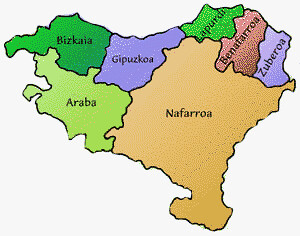
Euskal Herria
The race proceeds continuously without even stopping at night, and about 60,000 people take part in it. In order to raise money to promote the Basque language, each kilometer of the race is "sold" to a particular individual or company who will lead the race as it passes over the purchased kilometer, and as race leader will carry the original wooden baton from the first Korrika, adorned with the banner of the Basque Country, the Ikurriña.
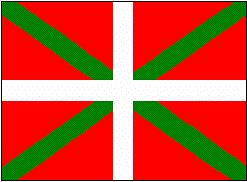
The Ikurriña
Directly behind the leader other participants will carry a banner with the slogan Euskal Herria euskalduntzen. Ni ere bai! (Spreading the Basque language in the Basque Country. Me too!). The race is conducted in an extremely jovial, uncompetitive spirit, accompanied by music and general fanfare, with roads thronged with spectators. During the period, a great many cultural activities are organised to promote the use of Basque, with the support of the Euskaltzaindia (Royal Academy of the Basque Language).
The special theme of the race's 15th edition, in 2007, will be a tribute to Basque women, and the unique role they have played in guaranteeing the language's preservation
The song for this year's Korrika, the 15th edition

Something small but significant happened in the history of the Welsh Language yesterday, something that didn't get a lot of attention beyond the borders of the rhithfro: The first installment of Siaradog.com was broadcasted, a show that is exclusive to the web. Forget about Friday Night with Jonathon Ross, here's Friday Morning with Aneirin Karadog. The show is only 16 minutes long, but I'm pretty sure it will prove to be the first of many such web-based programmes to come.

Aneirin Karadog
As on Mr Ross's show, guests sit on a sofa and are interviewed in a relaxed atmosphere -although they aren't introduced by four gay men and a piano- and the programme closes with a live musical performance (at least it does on the first show).
On the sofa this time was Nia Medi (formerly of the Johnny Panics), a very attractive girl and a talented musician (Im going to describe all the girls on the show this way because Im in my thirties and single), and also Catrin Dafydd, the author of the book Pili Pala which is one of this year's candidates for the Welsh Book of the Year, a very attractive girl and a talented novelist (I told you so).
Well done Siaradog.com!
It's interesting to compare the differences between the various Welsh party-political websites, differences which may indicate just how important or not Wales, Welsh politics and the Welsh language are to our political representatives.
Welsh Labour-Llafur Cymru
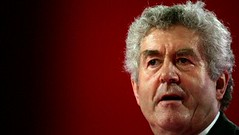
1. Despite the bilingual title, the website is monoglot English, with no preparation whatsoever for Welsh speaking visitors.
2. The homepage contents concentrate not on the achievments or aims of the party, but on portraying a rather personal and crude attack on Ieuan Wyn Jones
3. There's a link to "What Labour's done for you", but following the link -and depending on what constituency you pick- you arrive at either the contact details of a Labour MP (yes, MP, not AM) or you're presented with "Six things you can do to help Labour".
4. Apart from an "Elections 2007" logo the Welsh Assembly is almost completely ignored on the website itself. The logo has a link which leads on to some vague assertions about the party's success in the Assembly government, though from there you can download a PDF document with the title "250 Assembly Achievments", with details as to what Labour claims it has done since 1999. It is also from here that you can download a similar PDF file on the future intentions of Labour should they be re-elected. On the whole this is a poorly designed site and the dependence on PDF files makes things even more awkward.
Verdict: 1/4
Plaid Cymru
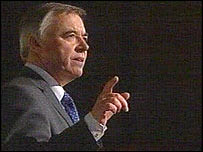
1. The website is 100% bilingual. What is more, it has a very professional look in terms of its design.
2. The homepage concentrates on Welsh political news, and it has easy-to-follow links to the aims, policies and campaigns of the party.
3. The aims and policies are easy to find, clear and legible. The policies are listed under the titles: A Bilingual Wales; A Free Wales; A Fair Wales; A Healthy Wales; A Learning Wales; A Sporting Wales; A Sustainable Wales; A Working Wales; An Equal Wales; Rural Wales; Wales and the World; Wales at Home; Wales on the Move; Wales in Europe.
4. The aims of the party are stated as:
Without a doubt (and as you can see for yourselves), of all the party websites Plaid Cymru's is the best in both design and bilingualism.
Verdict: 4/4
Ceidwadwyr Cymreig/Welsh Conservatives
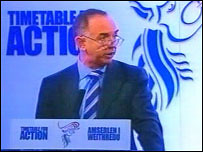
1. Apart from its five stated aims (see below), and the PDF policy files (also below), the webpage is monoglot English.
2.The "homepage" concentrates on news from Westminster, not Cardiff Bay.
3. This isn't an individual website, rather a couple of pages from the UK Conservative Party website. As in the case of Labour and the Lib-Dems, the Welsh Assembly is not visible. The link to policy, however, leads to a list of PDF files on Welsh Conservative policies regarding the Welsh Assembly Government, which, unlike the Labour PDF files, ARE bilingual.
4. The party aims (the only bilingual information available on the main webpage):
Verdict: 2/4
Welsh Liberal Democrats/ Democratiaid Rhyddfrydol Cymru
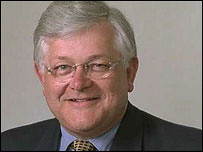
1. The website is mostly bilingual, but with gaps. As a result it has a very amateurish appearance.
2. The homepage contents concentrate on the party's last conference and on the fact that the Lib-Dems have one more seat than Plaid Cymru or the Conservatives in Westminster. As in the case of Labour and the Conservatives the Welsh Assembly has no role on the website.
3. There is no information on the party aims, and the link to party policy leads to a long list of conference speaches, not to any clear statements on policy.
Verdict: 1/4
Original Welsh version
Welsh Labour-Llafur Cymru

1. Despite the bilingual title, the website is monoglot English, with no preparation whatsoever for Welsh speaking visitors.
2. The homepage contents concentrate not on the achievments or aims of the party, but on portraying a rather personal and crude attack on Ieuan Wyn Jones
3. There's a link to "What Labour's done for you", but following the link -and depending on what constituency you pick- you arrive at either the contact details of a Labour MP (yes, MP, not AM) or you're presented with "Six things you can do to help Labour".
4. Apart from an "Elections 2007" logo the Welsh Assembly is almost completely ignored on the website itself. The logo has a link which leads on to some vague assertions about the party's success in the Assembly government, though from there you can download a PDF document with the title "250 Assembly Achievments", with details as to what Labour claims it has done since 1999. It is also from here that you can download a similar PDF file on the future intentions of Labour should they be re-elected. On the whole this is a poorly designed site and the dependence on PDF files makes things even more awkward.
Verdict: 1/4
Plaid Cymru

1. The website is 100% bilingual. What is more, it has a very professional look in terms of its design.
2. The homepage concentrates on Welsh political news, and it has easy-to-follow links to the aims, policies and campaigns of the party.
3. The aims and policies are easy to find, clear and legible. The policies are listed under the titles: A Bilingual Wales; A Free Wales; A Fair Wales; A Healthy Wales; A Learning Wales; A Sporting Wales; A Sustainable Wales; A Working Wales; An Equal Wales; Rural Wales; Wales and the World; Wales at Home; Wales on the Move; Wales in Europe.
4. The aims of the party are stated as:
To promote the constitutional advancement of Wales with a view to attaining Full National Status for Wales within the European Union.
To ensure economic prosperity, social justice and the health of the natural environment, based on decentralist socialism.
To build a national community based on equal citizenship, respect for different traditions and cultures and the equal worth of all individuals, whatever their race, nationality, gender, colour, creed, sexuality, age, ability or social background.
To create a bilingual society by promoting the revival of the Welsh language.
To promote Wales's contribution to the global community and to attain membership of the United Nations.
Without a doubt (and as you can see for yourselves), of all the party websites Plaid Cymru's is the best in both design and bilingualism.
Verdict: 4/4
Ceidwadwyr Cymreig/Welsh Conservatives

1. Apart from its five stated aims (see below), and the PDF policy files (also below), the webpage is monoglot English.
2.The "homepage" concentrates on news from Westminster, not Cardiff Bay.
3. This isn't an individual website, rather a couple of pages from the UK Conservative Party website. As in the case of Labour and the Lib-Dems, the Welsh Assembly is not visible. The link to policy, however, leads to a list of PDF files on Welsh Conservative policies regarding the Welsh Assembly Government, which, unlike the Labour PDF files, ARE bilingual.
4. The party aims (the only bilingual information available on the main webpage):
1. Making our economy more competitive
2. Improving our quality of life
3. Public service improvement
4. Protecting our security
5. Social justice
Verdict: 2/4
Welsh Liberal Democrats/ Democratiaid Rhyddfrydol Cymru

1. The website is mostly bilingual, but with gaps. As a result it has a very amateurish appearance.
2. The homepage contents concentrate on the party's last conference and on the fact that the Lib-Dems have one more seat than Plaid Cymru or the Conservatives in Westminster. As in the case of Labour and the Conservatives the Welsh Assembly has no role on the website.
3. There is no information on the party aims, and the link to party policy leads to a long list of conference speaches, not to any clear statements on policy.
Verdict: 1/4
Original Welsh version

Despite the growing visibility of Welsh within Wales, how many of you monoglot English speaking Welsh men and women know about what's going on in the Welsh speaking world? I'm not being critical here, by the way, just pointing out the obvious. We live in the same country, share the same roots, maybe even live on the same street, but to a certain extent both culturally and politically we live in two different dimensions. David Lynch would probably love us. But why harp on about it when instead we can share our realities?
Those of you who -not knowing the lingo- never watch S4/C digidol nor listen to Radio Cymru may be quite oblivious to just how much the Welsh Language music scene has flourished since entering the 21st century. 10 years ago there were some good bands but there was also a lot of, well, shall we say not-so-good bands (to be polite). Now what we have is a more musically diverse and plentiful supply of young musicians with the same musical standards as their English counterparts. So without any further ado here's a small selection for your delight and pleasure:
Sibrydion: Chiwawas
Drymbago: Anian
Genod Droog: Dal Ni Lawr
Radio Luxembourg: Os Chi'n Lladd Cindy
Sibrydion: Rhedeg i Ffwrdd
Gwilym Morus: Ar Ddisberod
Dan Amor: Lluniau Du a Gwyn
Swci Boscawen: Adar y Nefoedd
Rhian Mostyn: Hawl y Mynydd
Y Llongau: Rheoli Amser
Dan Amor: Cofiadau
About this blog
A group blog of translated posts by Welsh bloggers
Last posts
Archives
Site Feed
Links
Blog aggrators
- Blogiadur: Welsh language blogs
- BlogCymru: English language blogs
- The story of Welsh (BBC)
- Welsh language (Wikipedia)